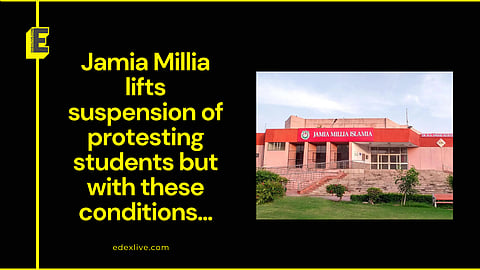

Days after the Delhi High Court intervened by staying suspension orders against seven of 17 students involved in campus protests at Jamia Millia Islamia (JMI), the university has decided to revoke their suspensions.
This decision was split into two distinct orders with specific directives, according to The Indian Express report today, Tuesday, March 18.
The protests, which led to their initial indefinite suspension on February 12, were linked to administrative measures, including showcause notices issued to two PhD students for allegedly raising slogans without permission during a “CAA-NRC Remembrance Day” event in December, as per the report.
In its first order, dated March 5, JMI uplifted the suspension of seven students who had sought judicial relief. The university permitted them to resume academic activities, but on a “strict commitment to uphold university rules and regulations.”
Six of these seven students, excluding one, were not required to sign a bond of good conduct. The order also cautioned them against participating in unauthorised protests or obstructing campus operations, such as blocking roads or buildings and activities that may disrupt the smooth functioning of the institution.
Conditional relief for 10 others
On March 12, JMI issued a separate order addressing the remaining 10 suspended students. Their suspensions were lifted, but with conditions: they must submit a ‘bond of good conduct’ within seven working days, reported The Indian Express.
Signed by Chief Proctor Naved Jamal, the order cited the disciplinary committee’s recommendations and the authority vested in JMI under Statute 31 of the JMI Act. The students were directed to resume their studies while adhering strictly to university regulations, with the bond serving as a formal pledge of compliance.
Fines for two students
Two students, Niranjan KS, and Saurabh Tripathi, received specific orders on March 12. Following a February 25 disciplinary committee meeting, their suspensions were revoked, but only if they paid fines, that is, Rs 3,000 for Niranjan and Rs 5,000 for Saurabh, alongside submitting a bond of good conduct within seven working days.
These additional penalties highlight a tailored disciplinary response based on individual involvement in the protests.
What is the bond of good conduct?
JMI’s ‘Bond of Good Conduct’ is a binding agreement requiring students to maintain good behaviour toward the university, its authorities, staff, students, and visitors.
Violation of this bond could lead to severe consequences, including expulsion or rustication. The university currently mandates prior approval for protests or gatherings, a rule which is underscored in the conditions to avoid any other disruptions in the future.
